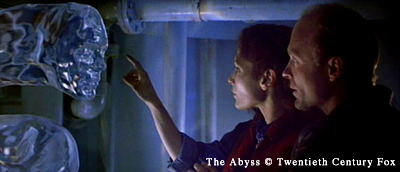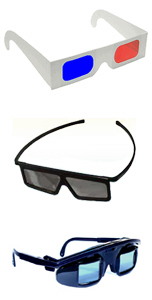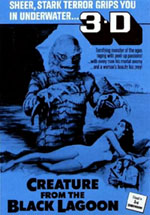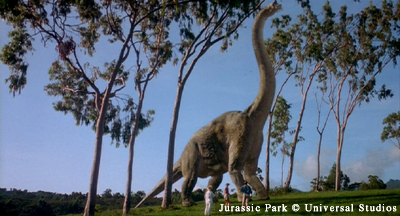
Any keen observer will note the future of filmmaking has already been creeping up on us. Pretty soon, it's going to be right in our face. Literally.
A few years ago, Titanic and Terminator creator, James Cameron, stated that he was already working on projects aimed at putting people back in theater seats. Do-it-all Director Robert Rodriguez developed the third film in the Spy Kids series as a 3-D film. Last year, Robert Zemeckis turned the children's tale, The Polar Express into not only a computer graphics fantasy that was shown in IMAX, but IMAX 3D no less. Cameron has even pushed the 3D envelope with Terminator 2: 3D - Battle Across Time and his docudramas Ghosts of the Abyss and Aliens Of The Deep. Even the late master storyteller Jim Henson developed Muppet-Vision 3D for Disney-MGM Studios. Not to be left out, Star Wars creator and technology wizard, George Lucas, who made it possible for these guys to tell their stories the way they do, has been pushing to have digital cinema projection and distribution systems in place for the future. So when these filmmakers (who have changed the way visual stories are told) come together, you know you're in for something that's both innovative and exhilarating.
On Thursday, as reported in this article from Reuters, Lucas, Cameron, Zemeckis, Rodriguez, Randal Kleiser, and 'The Lord of the Rings' himself, Peter Jackson (who joined the group by a pre-taped segment) addressed the ShoWest attendees and invited theater owners to invest in digital projection systems. Not content to sit and wait for the industry to catch up with their ideas, they've already begun forging the way we're going to experience movies. One of the really big names absent, was of course, Steven Spielberg, but you can bet he's got something in mind as well.
Lucas is working on re-mastering the existing Star Wars films for enjoyment in 3-D. James Cameron is preparing the Japanese Manga Battle Angel (Alita), as his return to science-fiction blockbuster filmmaking. It's going to be in 3-D and he says he hopes all his future movies will be in the format. Robert Zemeckis has two 3-D features in development, and Robert Rodriguez is developing The Adventures of Shark Boy & Lava Girl in 3-D. According to the article, Peter Jackson has already installed a 3-D master suite in his New Zealand production facility.
 Some conversion companies have already been successful in porting existing films for IMAX and 3D release. If it can be done with past favorites, imagine what the filmmakers can do with the technology that is currently being developed. It has the potential to make the stories that much more engaging for the audience. Of course, viewers don't want to wear giant headsets and existing viewing methods which include Anaglyph (red/blue) glasses, Polarized (grey/grey) glasses, and LCD Shutter glasses, are allowing the technology to get smaller in size, but it still hasn't quite caught up with filmmaker's imaginations.
Some conversion companies have already been successful in porting existing films for IMAX and 3D release. If it can be done with past favorites, imagine what the filmmakers can do with the technology that is currently being developed. It has the potential to make the stories that much more engaging for the audience. Of course, viewers don't want to wear giant headsets and existing viewing methods which include Anaglyph (red/blue) glasses, Polarized (grey/grey) glasses, and LCD Shutter glasses, are allowing the technology to get smaller in size, but it still hasn't quite caught up with filmmaker's imaginations. Classics like The Creature From the Black Lagoon in 3-D (a personal favorite) and House of Wax began the experiment years ago, but even back then, they didn't have an exact formula. 3-D was considered a gimmick, and like today, wasn't cheap to produce. Filmmakers created scenes that could make use of the 3-D technology but it really didn't add to the story. Current and future Filmmakers will have to clear that hurdle or audiences will quickly bore and won't embrace the new methods of entertainment immersion. If the new 3D films make us feel as if we're part of the action without noticing the technology, ticket sales should go well.
Classics like The Creature From the Black Lagoon in 3-D (a personal favorite) and House of Wax began the experiment years ago, but even back then, they didn't have an exact formula. 3-D was considered a gimmick, and like today, wasn't cheap to produce. Filmmakers created scenes that could make use of the 3-D technology but it really didn't add to the story. Current and future Filmmakers will have to clear that hurdle or audiences will quickly bore and won't embrace the new methods of entertainment immersion. If the new 3D films make us feel as if we're part of the action without noticing the technology, ticket sales should go well.Technology will never replace story as the fundamental force behind filmmaking, and the reason we go to movies in the first place, but it removes some of the limits placed upon the Writers and Directors in telling a story. The technology Lucas developed at Industrial Light and Magic for instance, allowed Barry Levinson to bring to life a stained-glass Medieval Knight in Young Sherlock Holmes, formed a water-based Alien Pseudopod in James Cameron's The Abyss and a liquid metal morphing cyborg in Terminator 2: Judgment Day, regenerated living dinosaurs in Steven Spielberg's Jurassic Park, constructed time-traveling DeLorean automobiles in Zemeckis' Back to the Future Trilogy, and allowed an angry Bee named Wally to chase Andre - digital forerunners to Pixar Animation Studios' Toy Story heroes, Buzz and Woody. What about the cursed skeleton pirates who came to life in Gore Verbinski's Pirates of the Caribbean: The Curse of The Black Pearl or a memorable character named Forrest Gump? It was thanks to the same digital technology that he was able to take part in famous events and converse with deceased political leaders.
Imagine X-Wing Fighters flying past your head, a Tyrannosaurus Rex eyeing you for a snack, possessed pirates leaping at you from a ghost ship, little green army men marching past your feet, cybernetic killers firing lasers into the audience, or you having to dodge the blow of an Orc sword during the attack at Helm's Deep. Some of these experiences exist today at theme parks or specially-equipped theaters, some of it's on the way, but these guys are bringing it to the masses. With the need to understand both storytelling and technology, I can think of no better group of talent to lead the charge. Hold on to your popcorn, because the adventure is just beginning.
Update: Joseph L. Kleiman from World Enteractive posted a report with a photo of the presentation which you can find by clicking here. 3-D clips that were shown included Disney's Lilo and Stitch, Top Gun, and two portions of the Star Wars saga. Thanks to The Digital Bits for the link.
Further Update: Harry Knowles at AintItCoolNews.com also comments on the situation. He addresses the film piracy issue with the possibility of it being reduced, though it relies on the belief that no home 3-D viewing methods (equal to the theater experience) will be available. As we know with the way technology progresses, that is only a matter of time. Pirates may still be able to isolate one half of the film image making it viewable on standard definition equipment, but only if the film relies on separate images for each eye.

No comments:
Post a Comment